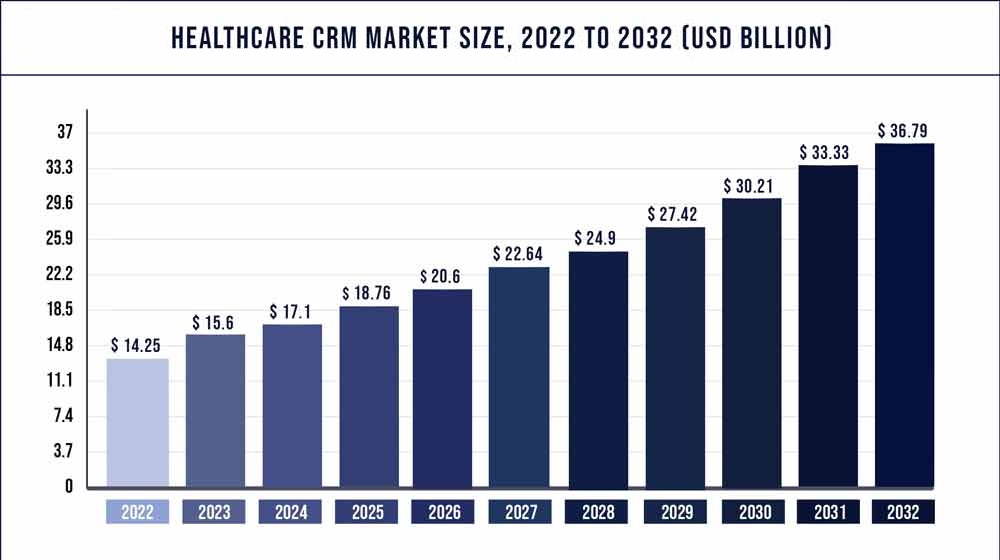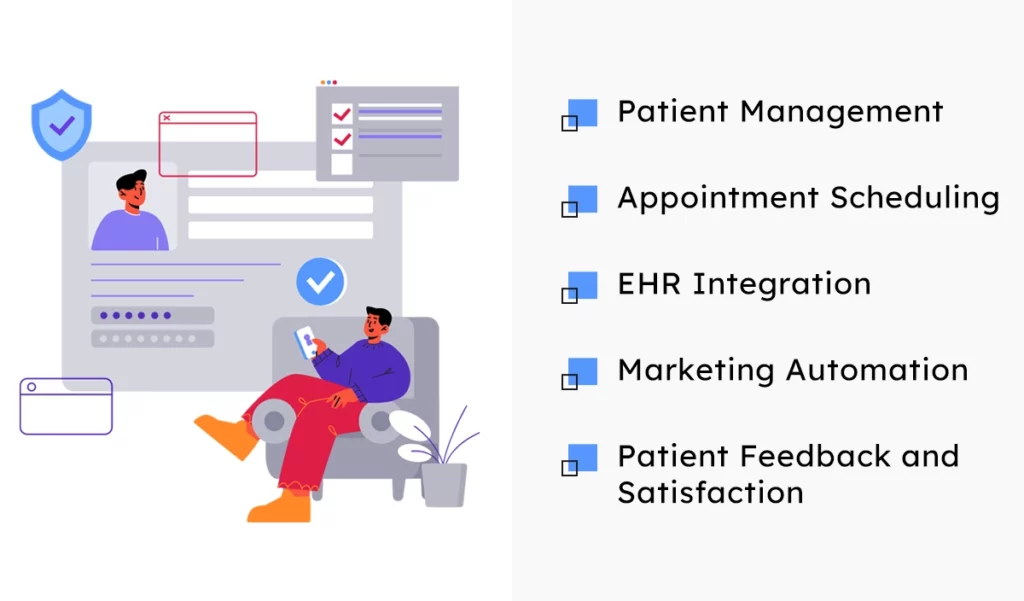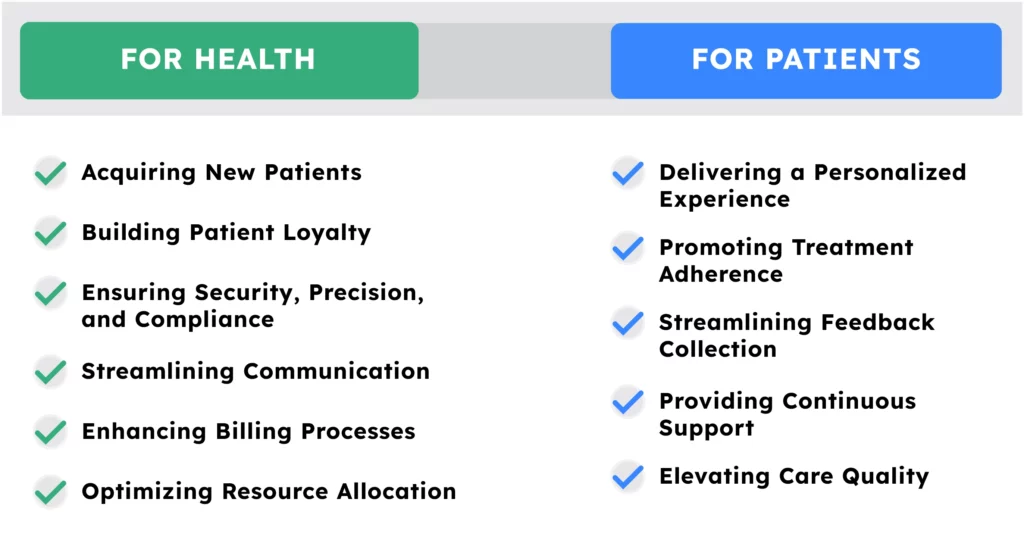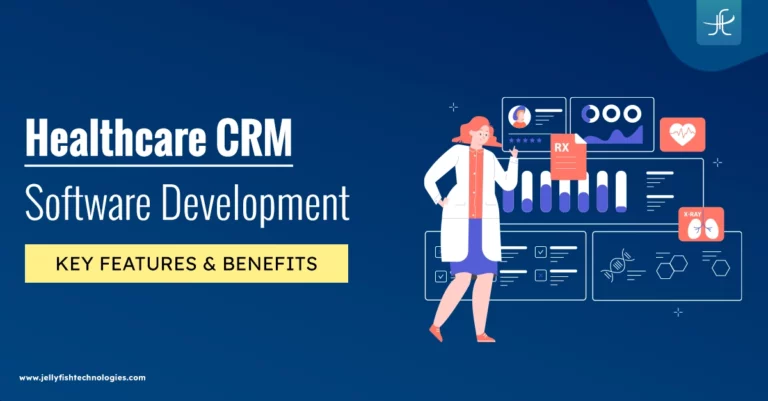The demand for healthcare customer relationship management software has skyrocketed in recent years, particularly since the onset of the COVID-19 pandemic. This surge in demand is driven by the need for medical institutions and startups to provide patients with affordable, comprehensive, and convenient services.
This transition from a clinical approach to fostering relationships is why CRM (customer relationship management) software is becoming the heartbeat of the healthcare industry.
Custom CRM development in the healthcare industry is a strategic approach that focuses on building and maintaining strong relationships with patients, which can lead to improved patient engagement, streamlined communication, and increased efficiency for healthcare providers.
According to a recent market report by Precedence Research, the global healthcare CRM market is expected to reach US$36.79 billion by 2032, growing at a compound annual growth rate (CAGR) of 10% from 2023 to 2032.

This significant growth indicates the growing importance of CRM in the healthcare industry and the need for healthcare providers to prioritize patient relationship management.
This blog presents an overview of healthcare custom CRM software, covering its key features, considerations, development process, and future trends.
What is Healthcare CRM Software?
Healthcare CRM software is a specialized customer relationship management system designed exclusively for use in the healthcare industry. This solution enables medical service providers to effectively store and manage patient information, improve their experience, automate sales and marketing processes, and comply with healthcare security regulations.
In healthcare, CRM is used to enhance patient relationships, streamline communication, manage appointments, integrate electronic health records, and improve overall operational efficiency for better patient-centered care.
Healthcare CRM Software: Core Features

1. Patient Management:
Efficiently manage patient information and interactions within the CRM system
- Patient Profiles: Create and maintain comprehensive patient profiles.
- Communication History: Track interactions and communication with each patient.
- Demographic Information: Store and update patient demographics.
2. Appointment Scheduling:
Streamline the appointment booking process for healthcare providers and patients.
- Real-time Scheduling: Enable real-time appointment scheduling for both patients and providers.
- Automated Reminders: Send automated reminders to reduce no-shows.
- Resource Allocation: Manage resources and availability for appointments efficiently.
3. Electronic Health Records (EHR) Integration:
Seamlessly integrate electronic health records into the CRM for a unified view of patient information.
- Data Accessibility: Access and update patient health records within the CRM.
- Interoperability: Ensure smooth data exchange between the CRM and EHR systems.
- Unified Patient Record: Provide healthcare providers with a holistic view of patient data.
4. Marketing Automation:
Automating marketing processes for CRM software development services and BPA (Business Process Automation) is crucial in this emerging tech world, including email campaigns, patient outreach, and targeted communications.
- Targeted Campaigns: Create and execute targeted marketing campaigns to specific patient segments, improving engagement.
- Lead Tracking: Monitor and analyze patient interactions to identify potential leads for new services or treatments.
5. Patient Feedback and Satisfaction:
Medical CRM facilitates the collection of patient feedback, helping healthcare organizations measure and improve patient satisfaction.
- Understanding patient experiences allows for continuous improvement in service delivery.
- Feedback Collection: Automate the collection of patient feedback, helping healthcare providers understand patient satisfaction and areas for improvement.
These key features are the building blocks of healthcare CRM software, collectively enhancing the patient care, communication, and overall efficiency of healthcare providers. The incorporation of appointment scheduling, patient management, and EHR services ensures a unified approach to healthcare service delivery.
Why Is There A Need For Healthcare CRM Software?
In today’s dynamic healthcare industry, patient engagement and satisfaction are more crucial than ever. Hospitals, clinics, and other healthcare providers face increasing competition and pressure to deliver personalized, efficient, and cost-effective care. This is where CRM software development services emerge as a powerful tool to bridge the gap and revolutionize patient relationships.
Here’s why medical CRM software has become paramount:
1. Improved Patient Acquisition and Retention:
Targeted marketing campaigns: Identify and reach out to potential patients based on demographics, health conditions, and treatment needs.
Personalized patient journeys: Create customized communication channels and engagement strategies to nurture leads and convert them into loyal patients.
Enhanced follow-up and proactive care: Automate post-appointment reminders, manage referrals, and provide ongoing support to maintain patient loyalty.
2. Streamlined Patient Management and Communication:
Centralized patient data: Securely store and manage patient information, including medical history, appointments, and billing details, in a single platform.
Improved communication efficiency: Streamline communication across departments and healthcare providers, facilitating timely care coordination and information sharing.
Personalized patient interactions: Deliver personalized updates, reminders, and educational materials based on individual needs and preferences.
3. Data-Driven Insights and Improved Business Processes:
Generate reports and analytics: With customer database software, track key performance indicators (KPIs) like patient engagement, referral rates, and appointment satisfaction to measure and optimize program effectiveness.
Identify trends and patterns: Gain valuable insights into patient behavior and preferences to personalize care delivery and marketing strategies.
Reduce administrative burden: Automate tasks like appointment scheduling, billing, and claims processing, freeing up time for patient care and improving operational efficiency.
4. Increased Revenue and Reduced Costs:
Targeted marketing campaigns: Attract and retain high-value patients, leading to increased revenue streams.
Improved operational efficiency: Reduce time spent on administrative tasks and optimize resource allocation, leading to cost savings.
Enhanced patient satisfaction: Increased patient engagement and loyalty can lead to improved healthcare outcomes and reduced readmission rates, further decreasing costs.
Healthcare CRM software goes beyond traditional CRM systems. It acts as a powerful patient relationship management tool, enabling healthcare providers to:
- Deliver personalized and patient-centric care.
- Improve operational efficiency and reduce costs.
- Increase patient satisfaction and loyalty.
- Gain valuable insights for data-driven decision-making.
In the face of evolving healthcare demands and evolving software development services, healthcare CRM software is not just a luxury but a strategic necessity. By embracing this technology, healthcare providers can navigate the changing landscape, improve patient experiences, and build a sustainable future for their organizations. If you’re looking for healthcare software developers to develop top-quality apps at an affordable price, contact our team.
What are the three types of CRM software?

1. Operational CRM:
- Purpose: Primarily focuses on streamlining and optimizing business processes related to customer-facing operations.
- Functions: Manages and automates various operational aspects like sales, marketing, and customer service.
Key Features:
- Sales Automation: Helps efficiently manage leads, opportunities, and sales pipelines.
- Marketing Automation: Streamlines marketing campaigns, lead generation, and customer engagement.
- Service Automation: Enhances customer support processes and ensures prompt issue resolution.
2. Collaborative CRM:
- Purpose: Emphasizes collaboration and information sharing among different departments within an organization to provide a unified customer experience.
- Functions: Facilitates communication and collaboration to ensure that all teams are on the same page regarding customer interactions.
Key Features:
- Interaction Management: Centralizes customer interactions and communication history.
- Channel Management: Coordinates customer interactions across various channels, ensuring consistency.
- Integrated Communication Tools: Provides tools for seamless communication among teams.
3. Analytical CRM:
- Purpose: Focuses on leveraging data analytics and business intelligence to gain insights into customer behavior, preferences, and trends.
- Functions: Analyzes and interprets customer data to inform strategic decision-making.
Key Features:
- Data Mining: Extracts valuable information from large datasets to identify patterns and trends.
- Reporting and Dashboards: Presents actionable insights through visual representations.
- Predictive Analytics: Anticipates future customer behaviors and preferences based on historical data.
Key Benefits of Healthcare CRM Software
We’ve outlined a fantastic list of key benefits of custom software in the healthcare industry when it comes to implementing CRM software. Let’s break them down further, highlighting the specific advantages for each group:

For Health Organizations:
1. Acquiring New Patients:
- Targeted marketing campaigns to reach ideal patients based on demographics and health needs.
- Streamlined referral management to convert leads into loyal patients.
- Improved online presence and patient outreach through CRM analytics.
2. Building Patient Loyalty:
- Personalized communication and engagement strategies to cultivate lasting relationships.
- Proactive follow-up and appointment reminders to improve patient satisfaction.
- Enhanced care coordination and responsiveness to patient needs.
3. Ensuring Security, Precision, and Compliance:
- HIPAA-compliant data storage and access control to protect patient information.
- Automated processes to minimize errors and improve data accuracy.
- Streamlined reporting and regulatory compliance tools.
4. Streamlining Communication:
- We have a centralized patient communication platform for efficient multi-channel engagement.
- Improved information sharing across departments and healthcare providers.
- Automated appointment confirmations and reminders to reduce administrative burden.
5. Enhancing Billing Processes:
- Integrated billing systems for faster and more accurate claim processing.
- Reduced administrative tasks and paperwork through automation.
- Improved revenue collection and financial management.
6. Optimizing Resource Allocation:
- Data-driven insights to identify areas for improvement and resource allocation. Additionally, data science in the healthcare industry is rapidly growing as it provides significant insights to medical providers.
- Increased operational efficiency and reduced wasted time.
- Improved staff scheduling and workload management.
For Patients:
1. Delivering a Personalized Experience:
- Tailored communication and educational materials based on individual needs and preferences.
- Proactive health management support and disease prevention guidance.
- Convenient online patient portal for appointment scheduling and health record access.
2. Promoting Treatment Adherence:
- Automated appointment reminders and medication refill notifications.
- Personalized patient education and self-management tools.
- Improved communication with healthcare providers for timely support and adjustments.
3. Streamlining Feedback Collection:
- Easy-to-use tools for providing feedback on appointments, treatments, and overall care experience.
- Improved responsiveness to patient concerns and suggestions.
- Enhanced patient satisfaction and quality improvement opportunities.
4. Providing Continuous Support:
- Convenient access to medical records and health information through the patient portal.
- Availability of online resources and educational materials.
- Improved communication and access to healthcare providers between appointments.
5. Elevating Care Quality:
- Data-driven insights to identify and address patient needs more effectively.
- Improved coordination and collaboration across healthcare teams.
- Personalized treatment plans and interventions based on individual data and feedback.
Adopting healthcare CRM software is a win-win situation for both organizations and patients. It empowers stronger relationships, empowers better decision-making, and ultimately leads to improved healthcare outcomes.

Steps to Healthcare CRM Software Development
Step 1: Choose A Healthcare CRM Development Partner
- Selecting the right software development company is crucial. Look for a company with experience in healthcare software development, a proven track record, and a deep understanding of healthcare industry regulations and compliance.
- Check for expertise in healthcare CRM development, familiarity with relevant standards like HIPAA, and the ability to provide ongoing support and updates.
Step 2: Conduct Thorough Market Research
- Understand the current landscape of healthcare CRM solutions, identify competitors, and assess market trends and user needs. This research informs the development process and ensures the new CRM system addresses existing gaps.
- Analyze existing healthcare CRM solutions, conduct surveys or interviews with potential users, and assess market demands and regulatory requirements.
Step 3: Planning And Requirement Gathering
- Collaborate with stakeholders, including healthcare professionals, administrators, and IT experts, to define project goals, functionalities, and scope. This step lays the foundation for a clear roadmap and successful project execution.
- Conduct workshops, interviews, and brainstorming sessions to gather requirements, define user stories, and establish a detailed project plan.
Step 4: Design And Plan Your Software
- Based on the gathered requirements, create a user-centric design and develop a detailed plan for software architecture. Prototyping allows stakeholders to visualize the system before full-scale development.
- Enhance user experience by redefining UI/UX services, creating prototypes, and finalizing the software architecture, ensuring alignment with the project’s objectives.
Step 5: Test, Deploy, Support & Maintenance
- Rigorously test the healthcare CRM software to ensure functionality, security, and compliance with healthcare regulations. Deployment is followed by continuous support and maintenance to address issues, provide updates, and optimize performance.
- Testing: Conduct functional testing, security testing, and user acceptance testing (UAT) to identify and rectify any issues.
- Deployment: Gradually roll out the CRM system, ensuring minimal disruption and maximum user adoption.
- Support & Maintenance: Provide ongoing support, address user queries, and perform routine maintenance to enhance system performance and address emerging needs.
Following these steps ensures a systematic and thorough approach to healthcare custom CRM software development, from initial planning to ongoing support, resulting in a solution that meets the specific needs of healthcare providers and enhances patient care.
Key Considerations in Healthcare CRM Software Development
Compliance and Security:
1. HIPAA Regulations:
- Adherence to the Health Insurance Portability and Accountability Act (HIPAA) is crucial to ensuring the confidentiality and security of patient information.
- Robust security measures and protocols to safeguard patient data, including access controls, encryption, and regular audits.
2. Data Encryption:
- Encrypting sensitive healthcare data during storage and transmission is essential to protect against unauthorized access and ensure data integrity.
- Utilization of advanced encryption algorithms for both data at rest and in transit, enhancing overall data security.
Customization for Diverse Healthcare Settings:
- Healthcare environments vary, and a one-size-fits-all approach may not be suitable. Customization allows the CRM software to adapt to the unique needs and workflows of different healthcare settings.
- Designing the custom CRM software with modular components, configurable features, and user-specific settings to accommodate diverse healthcare practices seamlessly.
Integration with Existing Systems:
1. EHR Integration:
- Integration with Electronic Health Records (EHR) is crucial for a unified and comprehensive view of patient information, avoiding duplication of efforts and ensuring accuracy.
- Develop APIs and interoperability standards to seamlessly connect the CRM system with existing EHR platforms. To opt for the best API integration services, reach out to us.
2. Billing System Compatibility:
- Billing processes are integral to healthcare operations, and compatibility with existing billing systems is essential for accurate financial transactions.
- Creating interfaces that allow smooth data exchange between the CRM software and billing systems ensures accurate invoicing and financial reporting.
These key considerations ensure that the healthcare CRM system is not only functional and user-friendly but also aligns with regulatory requirements, addresses the unique needs of different healthcare settings, and integrates seamlessly with existing systems for a cohesive and efficient healthcare ecosystem.
Conclusion
In conclusion, the dynamic landscape of healthcare necessitates advanced solutions, and healthcare CRM software emerges as a transformative force. As explored in this guide, the development journey involves strategic planning, user-centric design, and meticulous testing to align with the unique demands of the industry. By prioritizing compliance, security, and seamless integration, healthcare providers can enhance patient care, streamline operations, and foster meaningful connections. Looking ahead to 2024, the continuous evolution of healthcare CRM promises not only improved efficiency but also a more personalized, patient-centered approach, marking a significant step toward the future of healthcare management.
We would love to hear your comments relating to the post. Do you have some other thoughts? Drop us words through our contact page.


